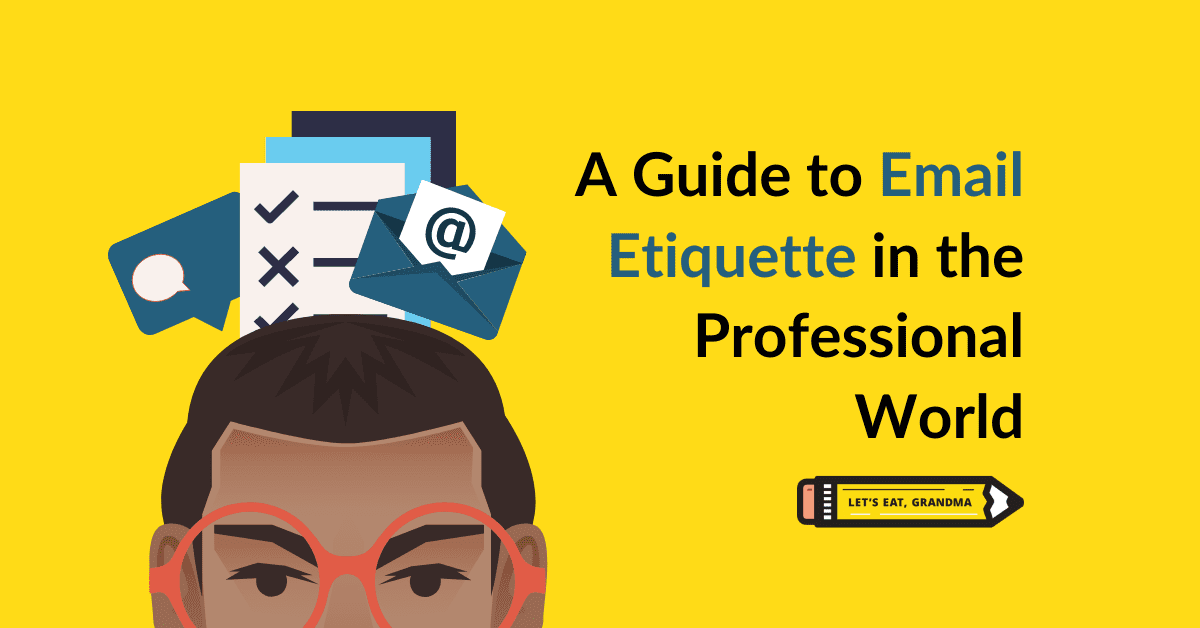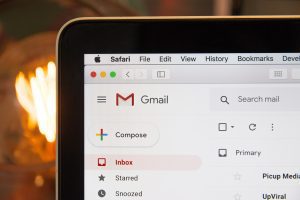A Guide to Professional World Email Etiquette for Recent Grads

Taking the time to craft thoughful, professional emails will ensure that your job applications and networking reach-outs make it to the top of the pack.
By: Katelyn Skye Bennett | Contributor for Let’s Eat, Grandma
As a recent graduate or young professional, quality email writing is a skill that you’ll need to perfect in order to move up in your field. The craft of writing professional emails builds upon the foundations of letter writing that you may have learned in elementary school but includes its own set of etiquette.
Firstly, make sure you are using a professional-sounding email address, like yourname@hostdomain.com and not something sexually suggestive or from your middle school years. Using unicornsR0ck97@hostdomain.com does not lend to a great first impression regarding your maturity!
Ready for more job search help?
Sign up for a free Senior Writer Resume Critique to see what's holding you back from landing interviews. One of our top professional resume writers will give you personalized feedback on the top 3 items you can improve based on our expert practices!
Four common mistakes include:
- Not including a subject line
- Writing an unclear message
- Leaving out your contact information
- Not responding promptly
Whether you’re reaching out to build your network, apply for a job, or send a follow-up email, correcting these four slip-ups will strengthen your communication and increase the response rate.
How to Write a Strong Subject Line

Use a strong subject line to ensure your email gets opened! Photo by Stephen Phillips – Hostreviews.co.uk on Unsplash.
A strong subject line is clear and includes keywords from your email. When submitting job applications or sending a follow-up email, it helps to include your name in the subject line, since an employer may have several in their inbox with just the application name listed.
Here are a couple examples:
“WIOA Referral from TTI – Janae Smith” – This tells me the program Janae is interested in, who sent her, and her name.
“Pre-K TA Application – Naoki Ikeda” – This tells me the specific job opening the client is applying for and again, their name in case the email gets lost and the employer needs to use their search function when you follow up with them.
Both of those examples address applications, but what about cold emails or informational interview requests?
You’ll still want to include a keyword for clarity and searchability, though you have options with your phrasing. You also want to write something that will catch the reader’s attention, like “Therapist advice request from a ‘20 Fisk alum” when reaching out to a counseling agency.
If you have a resource to share, you could use that as the subject in demonstration of the value you’re adding and add your request to connect in the body of the email itself. For example, if you have a relevant article on the topic, you could use the subject “Thoughts on background-friendly affordable housing development” when reaching out to someone in housing equity, homelessness advocacy, or working with returning citizens. Finally, keep in mind that only the first few words of the subject may display in the inbox, depending on the reader’s email platform.
Also, don’t type out your full email in the subject line. I’ve received emails like this, and let me tell you, it’s not an effective way of communicating.
Crafting a Cohesive Email Body
I frequently receive emails that say something to the gist of “I want to apply with you.” Sometimes that’s the entire email. There’s no comment on who referred them, so I have context on what they might already know, which program they mean since my agency is a social service provider, what they want out of that program, their preferred pronouns, or how to contact them by phone.
Good etiquette would address the reader and ensure that your introduction is clear (who you are, how you heard of the person or company you’re contacting, and why you’re reaching out).
While you don’t want the email to be too long, establishing your connection can help you build rapport. If you’re reaching out to an alumnus from your alma mater who works at a company that you’re interested in, note that connection. You can be direct about this or creative.
“I’m a 2021 DePaul graduate with a BA in business administration. Go Blue Demons! Professor Juarez mentioned that you’re working at This Company, and I’m writing because…”
If you’re reaching out to a reference to maintain your network, you could add or ask about something personal (yet appropriate for email):
“You’ve been a source of encouragement and fountain of advice during my high school years, even welcoming me into your home pre-COVID and introducing me to your adorable fur babies. You’re truly the best mentor I could have asked for, and you did it all on top of your crazy nursing schedule.
I’d love to continue our relationship by meeting for a 30 minute virtual coffee to discuss what a job in health care could look like as I think about higher education. Would you be available for a Zoom meeting at any of these times…?”
Bottom line, make some connection to the subject matter. That specificity shows you’ve done the work and are genuinely invested.
In reference to informational interviews, Lisa Lewis, CEO of Career Clarity, said on our Career Warrior Podcast, “If you can make (the recipient) feel like they’re the only person in the world who can answer your question, it’s way less likely that they are just going to archive your message or put it at the bottom of their to-do list. They’re going to feel a real connection to you, your mission, your purpose and want to support you.”
Lewis stated that brevity is your friend, as well.
A productive email is well-researched, whether it’s a cold email or an application. It also includes contact information, and likely some dates or times that you’re available in order to invite a response.
Finally, good etiquette would conclude the email with a symbol of gratitude, a thank you for their time and energy. A simple word of appreciation goes a long way. While an abrupt email can come across as rude or even give the impression that you’re self-absorbed, including a sincere and well-researched word of appreciation demonstrates that you’re approachable, informed, and have a positive attitude – all while brightening the reader’s day.
Adding the Final Touch

Don’t forget that final proofread before you hit “send.” Photo by Mathilde Langevin on Unsplash.
As always, proofreading is important. You’ll make a much better impression if your sentences are clear, the content cohesive, the capitalization standard, and spelling accurate.
A sleight of hand could have you referencing a certified nursing assistant (CNA) opening rather than the medical assistant one you intended (CMA), for example! Make sure to double-check that you’ve spelled the recipient’s name correctly, and while you’re at it, check your own name for typos, and your phone number. Honestly, I’ve had moments where I typed too fast and misspelled my own name. It happens, but proofreading helps you ensure that your contact doesn’t know about it!
Verify any attached files as well before sending!
If the body of your email is clear and concise, respectful, and worded in a way that invites future communication, you’re in good shape.
Advice on Following Up
When you reach out to somebody and they respond, try not to neglect their email. It’s easy to “lose” emails with so many messages coming in, but this is where responding promptly comes in handy. If you respond when you receive the email, you won’t have the chance to forget! And if you do respond later because you’re busy at the moment or need to gather information in order to respond, do so in a reasonable time frame, not weeks or months later.
You can follow up with an employer regarding an application about a week after submitting it. Persistence is useful here.
And of course, the thank you email is essential after you’ve interviewed for a position, but it’s also good etiquette to include one after you meet for an informational interview or develop a new work partnership.
This thank you can serve as a follow up to continue the conversation and helps establish rapport as you build relationships within your network, so even if the meeting doesn’t fill an immediate need, you’ve still made a valuable connection.
By using a professional email address and clear subject line in each email, writing a cohesive body and including your contact information, and wrapping up with a thank you each time, you demonstrate professionalism and put yourself in a position where you’re more likely to be noticed.
Don’t give up if you don’t hear back immediately. Put yourself in the shoes of the person you’re reaching out to and imagine how many emails they’re receiving per day, and follow up when necessary. If you have particular questions in the process, we recommend our Digital Guide to Cold Emails!
Ready for more job search help?
Sign up for a free Senior Writer Resume Critique to see what's holding you back from landing interviews. One of our top professional resume writers will give you personalized feedback on the top 3 items you can improve based on our expert practices!
Better Resume.
Satisfying Career.
Happier You.
